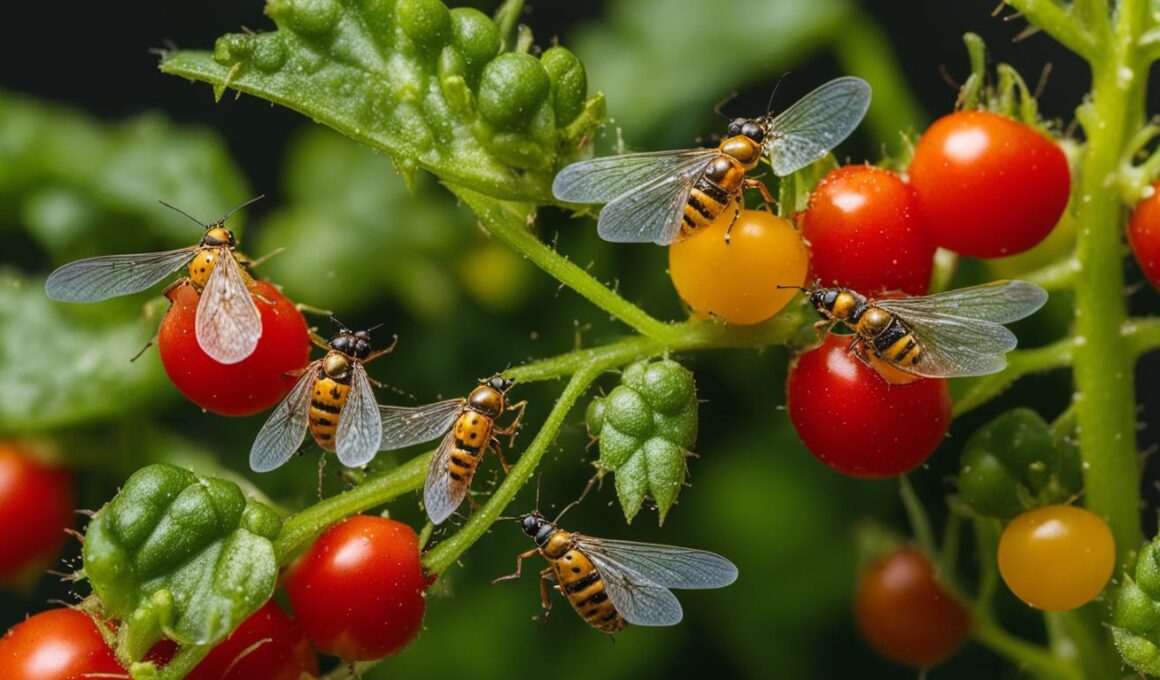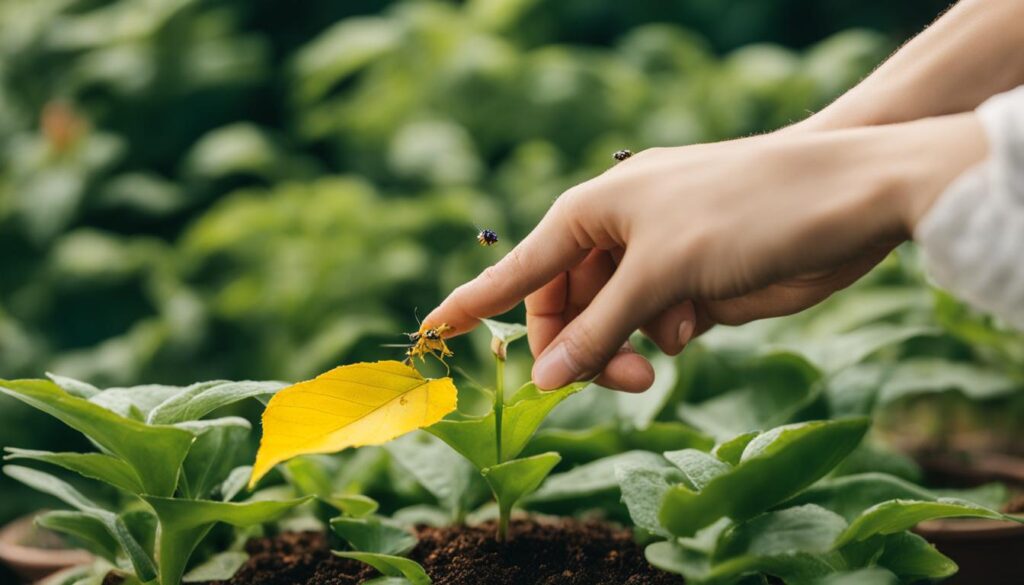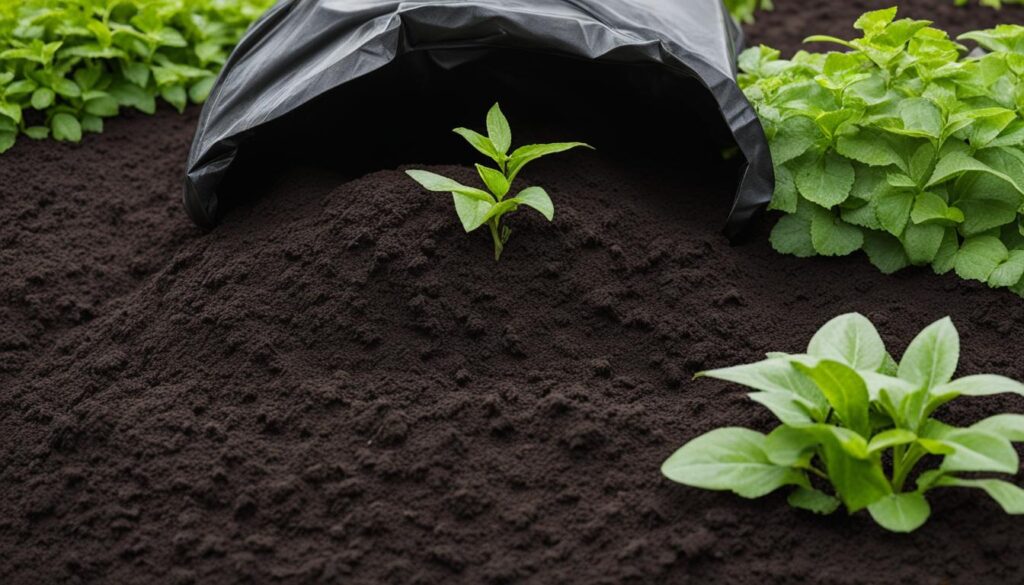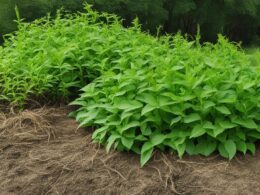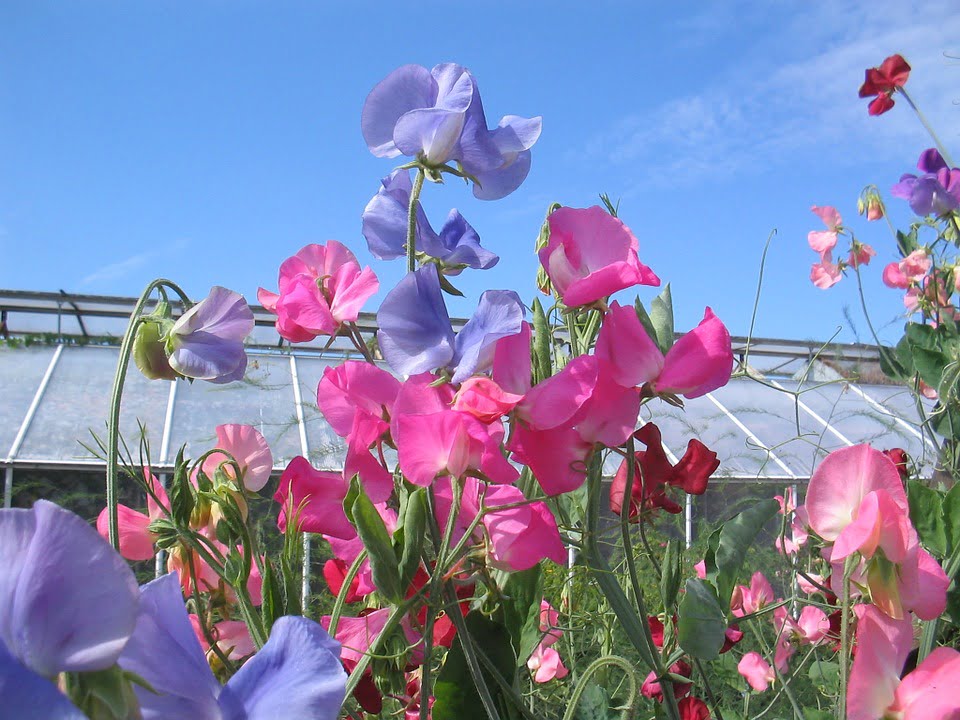Whiteflies can wreak havoc on your plants, but you don’t have to resort to harsh chemicals to control them. With natural solutions, you can effectively manage these garden pests and keep your plants healthy. In this section, we’ll explore a variety of home remedies for whiteflies that are safe and environmentally friendly.
Key Takeaways:
- Whiteflies can cause damage to plants and crops, especially in South Florida.
- Effective natural solutions for whitefly control include vacuuming, removing infested leaves, using dish soap and water sprays, adjusting nitrogen levels, applying mulch and fertilizer, watering plants regularly, using earthworm castings, maintaining cleanliness, and planting whitefly-repelling plants.
- Regular monitoring, good garden hygiene, and seeking professional help if necessary are important for managing whitefly infestations.
- By following these natural remedies, you can protect your garden from whiteflies and maintain healthy, thriving plants.
Vacuum ‘Em Up
If you’re looking for a simple and effective way to control whitefly populations in your garden, consider vacuuming them up. This natural whitefly treatment involves using a small handheld vacuum cleaner to suck up adult whiteflies early in the morning when they are slower-moving.
By removing adult whiteflies before they have a chance to lay eggs, you can prevent the infestation from spreading further. Once you have vacuumed up the whiteflies, seal the vacuum bag and freeze it for 24 hours to kill the bugs. This ensures that the whiteflies won’t return to your garden.
Not only is vacuuming an efficient method of whitefly control, but it also helps protect your plants from the destructive effects of these garden pests. By eliminating adult whiteflies, you can minimize the damage they cause to your plants’ leaves and stems.
| Vacuuming Whiteflies: An Effective Pest Control Method | Benefits |
|---|---|
| Removes adult whiteflies | Prevents infestation spread |
| Kills whiteflies by freezing | Protects plants from damage |
So, the next time you spot whiteflies in your garden, don’t hesitate to vacuum them up. It’s a natural and efficient way to control these pests and keep your plants healthy. Remember to dispose of the vacuum bag properly to ensure that the whiteflies are eliminated completely.
Pick Up Infested Leaves
One effective method for whitefly control is to remove infested leaves from your plants. Whiteflies tend to gather on the underside of leaves, where their nymphs, larvae, and pupae can be found. By inspecting your plants regularly and picking off infested leaves, you can prevent a whitefly outbreak and keep the population at a manageable level.
When removing infested leaves, it is important to be thorough. Carefully check both the tops and undersides of leaves, as whiteflies often lay their eggs on the underside. Dispose of the infested leaves by bagging them and throwing them in the trash. Do not compost them, as this can potentially spread whitefly infestation to other areas of your garden.
In cases where a plant is heavily infested or has died due to whitefly damage, it is crucial to remove and destroy the entire plant. This will help prevent the whiteflies from spreading to other nearby plants. Dispose of the infested plant material properly to ensure that the whiteflies do not have a chance to reinfest your garden.
Benefits of Removing Infested Leaves
“By removing infested leaves, you can disrupt the whitefly life cycle and prevent further infestation. This method is an important part of integrated pest management and can help protect your plants from the damaging effects of whiteflies.”
Table: Steps to Remove Infested Leaves
| Step | Description |
|---|---|
| 1 | Inspect your plants regularly for signs of whitefly infestation. |
| 2 | Identify infested leaves by checking the tops and undersides for whitefly nymphs, larvae, or pupae. |
| 3 | Carefully remove infested leaves, taking care not to damage the healthy parts of the plant. |
| 4 | Bag and dispose of infested leaves in the trash. Do not compost them. |
| 5 | If a plant is heavily infested or has died, remove and destroy the entire plant. |
By following these steps and removing infested leaves as soon as you spot them, you can prevent whitefly infestation from spreading and protect your plants from the damaging effects of these pests.
Use Dish Soap and Water
To effectively treat whiteflies and protect your plants, you can create a natural insecticide using simple household ingredients. Dish soap and water spray is an effective method for controlling whiteflies without the use of harmful chemicals. This homemade solution suffocates and kills the whiteflies while keeping your plants healthy.
Making the Dish Soap and Water Spray
To make the dish soap and water spray, mix one tablespoon of liquid dish soap with a gallon of water. Use a spray bottle to apply the solution onto the affected plants when you notice the whitefly population starting to increase. Ensure that both the upper and lower surfaces of the leaves are covered. The soapy water will coat the whiteflies, blocking their breathing pores and causing them to suffocate.
“The dish soap and water spray is an effective and natural way to control whiteflies in your garden.”
If you find that the homemade solution is too abrasive for your plants, you can consider purchasing an insecticidal soap specifically designed to control whiteflies. These soaps are formulated to be gentle on plants while effectively eliminating whiteflies. Follow the instructions on the packaging for application guidelines and safety precautions.
| Pros of Dish Soap and Water Spray | Cons of Dish Soap and Water Spray |
|---|---|
|
|
Using the dish soap and water spray, along with other natural solutions, can help you effectively manage and control whiteflies in your garden. Remember to monitor your plants closely and continue practicing good garden hygiene to prevent future infestations.
Check Your Nitrogen Levels
One important factor in protecting your plants from whitefly infestation is to check and maintain proper nitrogen levels in your soil. Nitrogen is an essential nutrient for plant growth, but excessive levels can make leaves thinner and more susceptible to whitefly infestation. By testing your soil’s nitrogen levels and making necessary adjustments, you can enhance your plants’ resistance to whiteflies.
Soil testing kits are readily available and easy to use. Follow the instructions provided with the kit to collect a soil sample and analyze the nitrogen content. Typically, a nitrogen level of around 40 parts per million (ppm) is sufficient for most vegetables. However, the ideal nitrogen level may vary depending on the specific plants you are growing. Consult a local garden center or agricultural extension service for specific recommendations.
If your soil’s nitrogen levels are too high, you can reduce the amount of nitrogen-rich fertilizer you apply or switch to a fertilizer with lower nitrogen content. On the other hand, if the nitrogen levels are too low, you can increase the amount of nitrogen-rich fertilizer or apply organic materials such as compost or well-rotted manure to boost nitrogen levels naturally. By maintaining the proper balance of nutrients, including nitrogen, you can help protect your plants from whiteflies and promote overall plant health.
Table: Recommended Nitrogen Levels for Common Vegetables
| Vegetable | Recommended Nitrogen Level (ppm) |
|---|---|
| Tomatoes | 30-60 |
| Cucumbers | 30-60 |
| Peppers | 40-80 |
| Lettuce | 40-80 |
| Carrots | 20-40 |
It’s important to note that while maintaining proper nitrogen levels can help reduce the risk of whitefly infestation, it is only one piece of the puzzle. Be sure to incorporate other natural pest control methods, such as removing infested leaves and using organic sprays, to create a comprehensive approach to whitefly management in your garden.
Apply Mulch and Fertilizer
Mulch and fertilizer can play a crucial role in preventing and controlling whiteflies in your garden. By using natural repellents and adjusting nutrient levels in the soil, you can create an environment that is less attractive to these pests.
When it comes to mulch, consider using aluminum reflective mulch. This type of mulch acts as a natural barrier, making it more difficult for whiteflies to infest your plants. The reflective surface disorients the pests, effectively deterring them from settling on your plants.
Additionally, applying a quality granular fertilizer can help strengthen your plants’ resistance against whiteflies. Look for a fertilizer that is rich in nitrogen and other essential nutrients. A well-nourished plant is less likely to become a target for whitefly infestation.
To create a visually engaging presentation, here is a table summarizing the benefits of applying mulch and fertilizer:
| Natural Repellents | Whitefly Prevention |
|---|---|
| Aluminum Reflective Mulch | Creates a barrier against whiteflies |
| Granular Fertilizer | Strengthens plants’ resistance |
By incorporating mulch and fertilizer into your garden maintenance routine, you can help protect your plants from whitefly infestations and promote their overall health and vitality.
Water Your Plants
Proper hydration is key to maintaining healthy plants and preventing whitefly infestations. Regular watering helps strengthen your plants’ natural defense mechanisms and makes them less vulnerable to pests like whiteflies. It also helps keep your plants thriving, especially during dry periods when their water needs are greater.
When watering your plants, it’s important to do so at the base of the plant rather than overhead. This helps prevent the leaves from staying wet for prolonged periods, which can attract whiteflies. Additionally, watering your plants with a gentle hose spray can dislodge any whiteflies present on the leaves, reducing their ability to cause damage.
Watering Tips for Whitefly Prevention
- Water your plants early in the morning to allow them to dry before evening, minimizing the risk of fungal diseases and attracting whiteflies.
- Check the soil moisture regularly to ensure it is neither too dry nor excessively waterlogged. Use your finger to gauge the moisture level, and water only when the top inch of soil feels dry.
- Apply a layer of organic mulch around your plants to help retain moisture and reduce water evaporation, reducing the frequency of watering needed.
- Consider using a soaker hose or drip irrigation system for more precise and efficient watering, delivering water directly to the roots without wetting the plant foliage.
By practicing regular and appropriate watering techniques, you can promote plant health and create an environment that is less conducive to whitefly infestations.
| Plant Type | Watering Frequency | Watering Amount |
|---|---|---|
| Leafy greens (such as lettuce and spinach) | Every 1-2 days | Light watering to keep the soil consistently moist |
| Flowering plants (such as roses and petunias) | Every 2-3 days | Deep watering to saturate the root zone |
| Vegetables (such as tomatoes and peppers) | Every 3-4 days | Deep watering to encourage deep root growth |
| Fruit trees (such as citrus and apple trees) | Every 7-10 days (varies based on tree size and weather conditions) | Slow, deep watering to reach the entire root system |
Remember, whiteflies are attracted to plants that are stressed or weakened, so maintaining proper hydration is essential in keeping them at bay. Combine regular watering with other natural pest control techniques discussed in this article to create a robust defense against whiteflies and ensure the health and vitality of your garden.
Are the natural solutions for whiteflies effective in controlling the infestation?
Many gardeners have had success with natural whitefly remedies explored, such as introducing beneficial insects like ladybugs or lacewings, using reflective mulch to deter whiteflies, and applying neem oil or insecticidal soap. These methods have shown to be effective in controlling whitefly infestations without the use of harsh chemicals.
Conclusion
In conclusion, controlling whiteflies in your garden can be achieved through natural solutions that are safe for both your plants and the environment. By implementing these whitefly control tips and home remedies, you can effectively manage and prevent whitefly infestations, ensuring the health and vitality of your garden.
To recap, some of the key strategies for natural garden pest control include vacuuming up whiteflies, removing infested leaves, using dish soap and water sprays, adjusting nitrogen levels, applying mulch and fertilizer, watering your plants regularly, and maintaining cleanliness in your yard.
Additionally, incorporating earthworm castings, planting whitefly-repelling plants, and utilizing sticky traps or natural predators can further enhance your whitefly control efforts. Remember to monitor your plants closely, practice good garden hygiene, and seek professional help if the infestation persists.
By following these natural methods, you can successfully combat whiteflies, keeping your garden pest-free and maintaining healthy plants throughout the year. By embracing sustainable and eco-friendly approaches, you can create a thriving garden ecosystem while protecting your plants from these pesky pests.
FAQ
How can I control whitefly populations in my garden?
There are several natural solutions you can try at home. These include vacuuming the insects, removing infested leaves, using dish soap and water sprays, adjusting nitrogen levels, applying mulch and fertilizer, watering plants regularly, using earthworm castings, maintaining cleanliness in your yard, and planting whitefly-repelling plants.
How do I vacuum up whiteflies?
Use a small handheld vacuum cleaner to suck up adult whiteflies early in the morning when they are slower-moving. Freeze the sealed vacuum bag for 24 hours to kill the bugs.
How can removing infested leaves help prevent a whitefly outbreak?
Whitefly nymphs, larvae, and pupae tend to gather on the underside of leaves. Removing and destroying infested leaves can keep the whitefly population at a manageable level.
Can dish soap and water kill whiteflies?
Yes, a solution of one tablespoon of liquid dish soap mixed with a gallon of water can suffocate and kill whiteflies. Spray the affected plants when the whitefly population is beginning to grow.
How can adjusting nitrogen levels help with whitefly resistance?
Lower levels of nitrogen in the soil can enhance plants’ resistance to whitefly infestation. Test your soil’s nitrogen levels using a soil test kit and adjust the fertilizer accordingly.
Can applying mulch and fertilizer help prevent whitefly infestations?
Yes, certain mulch and fertilizer products, such as aluminum reflective mulch and granular fertilizer, can act as natural repellents against whiteflies. These products provide a barrier and make it more difficult for whiteflies to infest your plants.
How does watering your plants regularly help prevent whiteflies?
Regular watering helps plants thrive and strengthen their natural defenses against pests. It can also dislodge any whiteflies currently present on the leaves, reducing their ability to damage the plants.
What are some other natural methods to control whiteflies?
Other natural methods include using earthworm castings, maintaining cleanliness in your yard, planting whitefly-repelling plants, and using sticky traps or natural predators.





